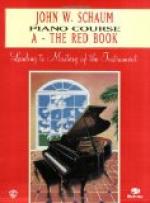“In regard to memorizing piano compositions. I do it phrase by phrase, and at the instrument, unless I am traveling or unable to get to a piano, in which case I think it out from the notes. If the piece is very difficult I take a short passage of two or three measures and play each hand separately and then together; but generally I play the passage complete—say half a dozen times with the notes, and then repeat it the same number of times from memory. Perhaps the next day I have forgotten it, so the work has to be done over again; the second time, however, it generally sticks.
“My great longing and ambition is to write music, to become a composer. With this end in view, I give whatever time I am able to the study of composition. I hope some day to create something that will be worthy the high aim I have before me.”
VIII
BERTHA FIERING TAPPER
MASTERING PIANISTIC PROBLEMS
If environment and atmosphere are inspirational aids to piano teaching and playing, the students of Mrs. Thomas Tapper have the incentives of both in their lesson hours. Her apartments on the Drive have the glory of sunlight all the long afternoons. Outside the Hudson shimmers in blue and gold; indoors all is harmonious and home-like. In the large music-room, facing the river, two grand pianos stand side by side; there are many portraits and mementoes of the great in music; fresh flowers, books—everything to uplift thought; while in the midst of it all is Mrs. Tapper herself, the serious, high-minded, inspiring teacher; the “mother confessor” to a large number of young artists and teachers.
“Music study means so much more than merely exercising the fingers,” she said; “the student should have a good all-round education. When young people come to me for instruction, I ask what they are doing in school. If they say they have left school in order to devote their whole time to the piano, I say, ’Go back to your school, and come to me later, when you have finished your school course.’ It is true that in rare cases it may be advisable for the student to leave school, but he should then pursue general or special studies at home. I often wish the music student’s education in this country could be arranged as it is in at least one of the great music schools in Russia. There the mornings are given to music, while general studies are taken up later in the day. It is really a serious problem, here in America, this fitting in music with other studies. Both public and private schools try to cover so much ground that there is very little time left for music or anything else. The music pupil also needs to know musical literature, history and biography, to be familiar with the lives and writings of the great composers. Take the letters and literary articles of Robert Schumann, for instance. How interesting and inspiring they are!




